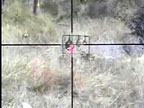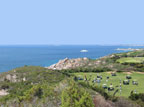:: Monday, November 29, 2004 ::
 ORIGINAL POST: Friday, November 19, 2004
ORIGINAL POST: Friday, November 19, 2004
BY: Eduardo Navas
The following is not net art. In fact it is not art at all. Yet, the issues it raises about online activity are worth considering.
Live-shot.com offers online clients a chance at shooting with guns via an online connection. In fact, it claims to offer the shooting range experience to anyone who is willing to pay an online membership. The potential to hunt wild animals is one of the things they are now working on. But at this point it is the shooting range that's the main attraction.
Some questions that arise are, if something goes wrong with the internet connection and for some reason a person or animal gets shot and maybe even killed, how will the courts deal with the complexities of the online experience? Can they treat it like any other accidental shooting? And what if the person lives in another state that has different hunting regulations from those of Texas, or where even hunting is prohibited? What about another country? Would that person be liable under Texas law?
On another level this website begins to make connections between online gaming experience and real life. One may wonder if online gamers would on some level approach online hunting like any other game they play on an everyday basis. The danger here lurks in misunderstanding differences between shooting and killing in a game vs. in real life. This might be hard to comprehend by online user, when the experience relies on the same essential tools to bring users two very different activities.
 ORIGINAL POST: Friday, November 26, 2004
ORIGINAL POST: Friday, November 26, 2004BY: Ana Boa-Ventura
I was just home, in Lisbon, to speak at the Numero Festival 2004 --"GAZING AT …. LISBON'S CITYSCAPE: NEW MEDIA: FRONTIERS AND STRATEGIES"
I saw myself in the strange situation of representing the US in my own country :). Eric Sadin (Tokyo Reengineering) was the other international presence. Initially scheduled to speak, Peppino Ortoleva (Italy) and Gerfried Stocker (Austria) had to miss the event, for different reasons. We had Gerfried by videoconference though. Among the other Portuguese speakers, I would like to stress Miguel Leal's presentation about artists and institutions working in Portugal.
My main conclusion is that there is a lot to do in Portugal, in the field of new media. Portugal suffers from an undesirable side-effect of living in a small democratic country: when there is a change of direction (which occurs constantly) - and Director bodies - in entities such as the Ministry of Culture and the Ministry of Science and Technology, it directly affects the definition of policies of support for the arts. Our government (which funds most of the national cultural and artistic endeavors) still has to define a clear policy in this field... one that may inform universities and institutions alike of strategies and approaches to take.
A lot is happening though even in the absence of consistent governmental support. What is taking place in Portugal right now is of top quality - check out www.virose.pt (that I will be talking about later) to see what I mean.
 ORIGINAL POST: Sunday, November 21, 2004
ORIGINAL POST: Sunday, November 21, 2004BY: Daniele Balit
Samuel Bianchini has just discussed his PHD thesis at the Palais de Tokyo in Paris, a location that allowed him to present at the same time a selection of his artistic works related to the themes he dealt with theoretically in his thesis. A critique of interactive images is the main subject of his research. “Temps libre” is an example of how the spectator is asked to play an active role, almost dictatorial, in the functioning of the work: a quiet video of a sea landscape is thus disturbed by our voice (through a loudspeaker) that activates a series of small energetic golf players. The more we speak loudly and fast the more the players become energetic, until they reach a nonsensical frenzy completely in opposition to the calmness of the initial scene.